Classical Greek Orators Collection (30 vols.)
Digital Logos Edition
This product has been transferred from Community Pricing to Pre-Pub. The actual funding level may be lower than it appears, which could delay production. The amount of funding still needed will be evaluated and updated soon.
Overview
The Classical Greek Orators Collection includes speeches and letters from 11 of the most influential orators of the fourth and fifth centuries BC. Since the days of Homer, the art of public speaking was of great value in Greece. Eventually, oratory became a focal subject in Greek education, thanks in large part to the lasting influences of orators from the classical era.
This 30-volume collection contains the works of the most influential classical orators, known later as the Alexandrian “Canon of 10”: Aeschines, Antiphon, Andocides, Demosthenes, Dinarchus, Hyperides, Isaeus, Isocrates, Lycurgus, and Lysias. The works of the great Athenian political leader Demosthenes make up the heart of the collection. His orations, which motivated opposition toward Philip II of Macedon and Alexander the Great, are exemplars of the art of oratory. Students and scholars of history, politics, religion, rhetoric, or the classics will enjoy these works and appreciate the vivid pictures they provide of public and private life in classical Greece.
With Logos Bible Software, this collection is completely searchable, making the text more powerful and easier to access for scholarly work and personal study. The Logos version integrates seamlessly into your digital library—clicking any word opens your lexicons to the relevant entry. Each text includes the original Greek and an English translation for side-by-side comparison. Use Logos’ language tools to go deeper into the Greek text and explore each orator’s elegant language.
Key Features
- Speeches and letters from 11 of the greatest classical Greek orators
- English translations as well as original Greek texts
- Loeb Classical Library editions
Product Details
- Title: Classical Greek Orators Collection
- Series: Loeb Classical Library
- Volumes: 30
- Pages: 8,096
Individual Titles
- Minor Attic Orators, vol. 1 by Antiphon and Andocides
- Minor Attic Orators, vol. 1: Greek Text by Antiphon and Andocides
- Minor Attic Orators, vol. 2 by Lycurgus, Damades, Dinarchus, and Hyperides
- Minor Attic Orators, vol. 2: Greek Text by Lycurgus, Damades, Dinarchus, and Hyperides
- The Speeches of Aeschines
- The Speeches of Aeschines: Greek Text
- Isaeus
- Isaeus: Greek Text
- Demosthenes, vol. 1
- Demosthenes, vol. 1: Greek Text
- Demosthenes, vol. 2
- Demosthenes, vol. 2: Greek Text
- Demosthenes, vol. 3: Against Meidias, Androtion, Aristocrates, Timocrates, Aristogeiton
- Demosthenes, vol. 3: Against Meidias, Androtion, Aristocrates, Timocrates, Aristogeiton: Greek Text
- Demosthenes, vol. 4
- Demosthenes, vol. 4: Greek Text
- Demosthenes, vol. 5
- Demosthenes, vol. 5: Greek Text
- Demosthenes, vol. 6
- Demosthenes, vol. 6: Greek Text
- Demosthenes, vol. 7
- Demosthenes, vol. 7: Greek Text
- Isocrates, vol. 1
- Isocrates, vol. 1: Greek Text
- Isocrates, vol. 2
- Isocrates, vol. 2: Greek Text
- Isocrates, vol. 3
- Isocrates, vol. 3: Greek Text
- Lysias
- Lysias: Greek Text
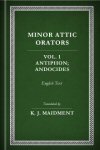
This volume contains K. J. Maidment’s translations of the speeches of Antiphon and Andocides.
Antiphon spent his prime in the great period of Athens but, disliking democracy, was himself an ardent oligarch who, with others, set up a violent, short-lived oligarchy in 411. The restored democracy executed him for treason. He was a writer of speeches for other people involved in litigation. Of the 15 surviving works, three concern real murder cases. The others are exercises in speechcraft consisting of three tetralogies, each tetralogy comprising four skeleton speeches: accuser’s, defendant’s, accuser’s reply, and defendant’s counter-reply.
Andocides disliked the extremes of both democracy and oligarchy. He was exiled after a religious scandal in 415 BC. After at least two unsuccessful attempts, he finally returned under the amnesty of 403. In 399, he was acquitted on a charge of profaning the Mysteries, and in 391–390, took part in an abortive peace embassy to Sparta.
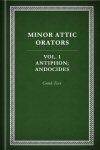
This volume contains the Greek texts of the speeches of Antiphon and Andocides.
Antiphon spent his prime in the great period of Athens but, disliking democracy, was himself an ardent oligarch who, with others, set up a violent, short-lived oligarchy in 411. The restored democracy executed him for treason. He was a writer of speeches for other people involved in litigation. Of the 15 surviving works, three concern real murder cases. The others are exercises in speechcraft consisting of three tetralogies, each tetralogy comprising four skeleton speeches: accuser’s, defendant’s, accuser’s reply, and defendant’s counter-reply.
Andocides disliked the extremes of both democracy and oligarchy. He was exiled after a religious scandal in 415 BC. After at least two unsuccessful attempts, he finally returned under the amnesty of 403. In 399, he was acquitted on a charge of profaning the Mysteries, and in 391–390, took part in an abortive peace embassy to Sparta.
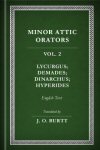
This volume contains J. O. Burtt’s translations of the speeches of four orators involved in the ill-fated resistance of Athens to the power of Philip and Alexander the Great.
Lycurgus of Athens, ca. 396–325 BC, concentrated on domestic affairs and naval matters. He also constructed and repaired important public buildings. Athens refused to surrender him to Alexander and honored him until his death.
Dinarchus of Corinth, ca. 361–291, became a forensic speaker and also assailed Demosthenes and others. He was accused by Alexander’s runaway treasurer Harpalus of corruption. Dinarchus favored oligarchic government under Macedonian control. He prospered under the regency of Demetrius Phalereus (317–307), but was exiled after the restoration of democracy.
Demades of Athens, ca. 380–318, was an able seaman, then unscrupulous politician. He favored Philip, but fought for Athens at Chaeronea in 338. Captured there and released by Philip, he helped make peace, and later influenced Alexander and then Antipater in Athens’ favor. His tortuous policy and acceptance of bribes ruined him, and he was executed by Antipater.
Hyperides of Athens, ca. 390–322, was a forensic and political speaker who was hostile to Philip and led Athens’ patriots after 325. For resistance to Antipater, he was ultimately killed. What survives today of his speeches was discovered in the nineteenth century.
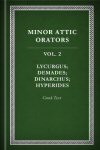
This volume contains the Greek texts of the speeches of four orators involved in the ill-fated resistance of Athens to the power of Philip and Alexander the Great.
Lycurgus of Athens, ca. 396–325 BC, concentrated on domestic affairs and naval matters. He also constructed and repaired important public buildings. Athens refused to surrender him to Alexander and honored him until his death.
Dinarchus of Corinth, ca. 361–291, became a forensic speaker and also assailed Demosthenes and others. He was accused by Alexander’s runaway treasurer Harpalus of corruption. Dinarchus favored oligarchic government under Macedonian control. He prospered under the regency of Demetrius Phalereus (317–307), but was exiled after the restoration of democracy.
Demades of Athens, ca. 380–318, was an able seaman, then unscrupulous politician. He favored Philip, but fought for Athens at Chaeronea in 338. Captured there and released by Philip, he helped make peace, and later influenced Alexander and then Antipater in Athens’ favor. His tortuous policy and acceptance of bribes ruined him, and he was executed by Antipater.
Hyperides of Athens, ca. 390–322, was a forensic and political speaker who was hostile to Philip and led Athens’ patriots after 325. For resistance to Antipater, he was ultimately killed. What survives today of his speeches was discovered in the nineteenth century.

This volume contains C. D. Adams’ translations of the speeches of Aeschines.
Aeschines (389–14 BC) was an orator and statesman of Athens. He became active in politics about 350, and in 348 was a member of a mission sent to the Peloponnese to stir up feeling against the growing power of King Philip of Macedon; in 347, though, he was won over to sympathy with the king, and became a supporter of the peace policy of the Athenian statesman Eubulus. On a second embassy in 346 to ratify a peace, Aeschines’ delaying tactics caused the famous orators Demosthenes and Timarchus to accuse him of treason, a charge which he successfully rebutted. In 344, when Demosthenes accused him again in a speech, Aeschines was again acquitted. In 336, Aeschines left Athens and set up a school of rhetoric at Rhodes. He died in Samos.

This volume contains the Greek texts of the speeches of Aeschines.
Aeschines (389–14 BC) was an orator and statesman of Athens. He became active in politics about 350, and in 348 was a member of a mission sent to the Peloponnese to stir up feeling against the growing power of King Philip of Macedon; in 347, though, he was won over to sympathy with the king, and became a supporter of the peace policy of the Athenian statesman Eubulus. On a second embassy in 346 to ratify a peace, Aeschines’ delaying tactics caused the famous orators Demosthenes and Timarchus to accuse him of treason, a charge which he successfully rebutted. In 344, when Demosthenes accused him again in a speech, Aeschines was again acquitted. In 336, Aeschines left Athens and set up a school of rhetoric at Rhodes. He died in Samos.
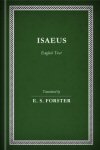
Isaeus
- Author: Isaeus
- Translator: E. S. Forster
- Series: Loeb Classical Library
- Publisher: Harvard University Press
- Publication Date: 1927
- Pages: 256
This volume contains E. S. Forster’s translations of the speeches of Isaeus.
Isaeus (420–350 BC) was a native of Chalcis in Euboea and the teacher of Demosthenes.
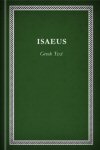
Isaeus: Greek Text
- Author: Isaeus
- Series: Loeb Classical Library
- Publisher: Harvard University Press
- Publication Date: 1927
- Pages: 256
This volume contains the Greek texts of the speeches of Isaeus.
Isaeus (420–350 BC) was a native of Chalcis in Euboea and the teacher of Demosthenes.
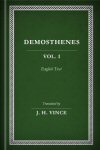
Demosthenes, vol. 1
- Author: Demosthenes
- Translator: J. H. Vince
- Series: Loeb Classical Library
- Publisher: Harvard University Press
- Publication Date: 1930
- Pages: 320
This volume contains J. H. Vince’s translations of nine famous speeches in which Demosthenes attempted to rouse Athenian alarm about Macedonian ambitions.
Demosthenes (384–322 BC) was a pleader in law courts who later became a statesman. Known as the best Athenian orator, he was a champion of the past greatness of his city and of the resistance of Greece to the rise to supremacy of Philip of Macedon. He is known for his steadfastness of purpose, his sincerity, his clear arguments, and his severe control of language.
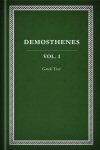
Demosthenes, vol. 1: Greek Text
- Author: Demosthenes
- Series: Loeb Classical Library
- Publisher: Harvard University Press
- Publication Date: 1930
- Pages: 320
This volume contains the Greek texts of nine famous speeches in which Demosthenes attempted to rouse Athenian alarm about Macedonian ambitions.
Demosthenes (384–322 BC) was a pleader in law courts who later became a statesman. Known as the best Athenian orator, he was a champion of the past greatness of his city and of the resistance of Greece to the rise to supremacy of Philip of Macedon. He is known for his steadfastness of purpose, his sincerity, his clear arguments, and his severe control of language.
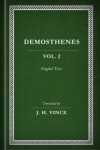
Demosthenes, vol. 2
- Author: Demosthenes
- Translator: J. H. Vince
- Series: Loeb Classical Library
- Publisher: Harvard University Press
- Publication Date: 1926
- Pages: 248
This volume contains J. H. Vince’s translations of De Corona and De Falsa Legatione.
Demosthenes (384–322 BC) was a pleader in law courts who later became a statesman. Known as the best Athenian orator, he was a champion of the past greatness of his city and of the resistance of Greece to the rise to supremacy of Philip of Macedon. He is known for his steadfastness of purpose, his sincerity, his clear arguments, and his severe control of language.
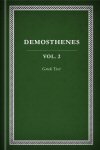
Demosthenes, vol. 2: Greek Text
- Author: Demosthenes
- Series: Loeb Classical Library
- Publisher: Harvard University Press
- Publication Date: 1926
- Pages: 248
This volume contains the Greek texts of De Corona and De Falsa Legatione.
Demosthenes (384–322 BC) was a pleader in law courts who later became a statesman. Known as the best Athenian orator, he was a champion of the past greatness of his city and of the resistance of Greece to the rise to supremacy of Philip of Macedon. He is known for his steadfastness of purpose, his sincerity, his clear arguments, and his severe control of language.
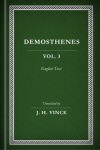
This volume contains J. H. Vince’s translations of speeches against Meidias, Androtion, Aristocrates, Timocrates, and Aristogeiton.
Demosthenes (384–322 BC) was a pleader in law courts who later became a statesman. Known as the best Athenian orator, he was a champion of the past greatness of his city and of the resistance of Greece to the rise to supremacy of Philip of Macedon. He is known for his steadfastness of purpose, his sincerity, his clear arguments, and his severe control of language.
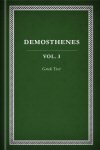
This volume contains the Greek texts of speeches against Meidias, Androtion, Aristocrates, Timocrates, and Aristogeiton.
Demosthenes (384–322 BC) was a pleader in law courts who later became a statesman. Known as the best Athenian orator, he was a champion of the past greatness of his city and of the resistance of Greece to the rise to supremacy of Philip of Macedon. He is known for his steadfastness of purpose, his sincerity, his clear arguments, and his severe control of language.
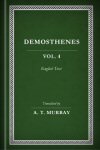
Demosthenes, vol. 4
- Author: Demosthenes
- Translator: A. T. Murray
- Series: Loeb Classical Library
- Publisher: Harvard University Press
- Publication Date: 1936
- Pages: 272
This volume contains A. T. Murray’s translations of Demosthenes’ speeches 27–40.
Demosthenes (384–322 BC) was a pleader in law courts who later became a statesman. Known as the best Athenian orator, he was a champion of the past greatness of his city and of the resistance of Greece to the rise to supremacy of Philip of Macedon. He is known for his steadfastness of purpose, his sincerity, his clear arguments, and his severe control of language.
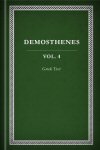
Demosthenes, vol. 4: Greek Text
- Author: Demosthenes
- Series: Loeb Classical Library
- Publisher: Harvard University Press
- Publication Date: 1936
- Pages: 272
This volume contains the Greek texts of Demosthenes’ speeches 27–40.
Demosthenes (384–322 BC) was a pleader in law courts who later became a statesman. Known as the best Athenian orator, he was a champion of the past greatness of his city and of the resistance of Greece to the rise to supremacy of Philip of Macedon. He is known for his steadfastness of purpose, his sincerity, his clear arguments, and his severe control of language.
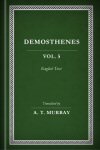
Demosthenes, vol. 5
- Author: Demosthenes
- Translator: A. T. Murray
- Series: Loeb Classical Library
- Publisher: Harvard University Press
- Publication Date: 1939
- Pages: 216
This volume contains A. T. Murray’s translations of Demosthenes’ speeches 41–49.
Demosthenes (384–322 BC) was a pleader in law courts who later became a statesman. Known as the best Athenian orator, he was a champion of the past greatness of his city and of the resistance of Greece to the rise to supremacy of Philip of Macedon. He is known for his steadfastness of purpose, his sincerity, his clear arguments, and his severe control of language.
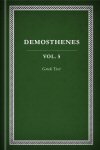
Demosthenes, vol. 5: Greek Text
- Author: Demosthenes
- Series: Loeb Classical Library
- Publisher: Harvard University Press
- Publication Date: 1939
- Pages: 216
This volume contains the Greek texts of Demosthenes’ speeches 41–49.
Demosthenes (384–322 BC) was a pleader in law courts who later became a statesman. Known as the best Athenian orator, he was a champion of the past greatness of his city and of the resistance of Greece to the rise to supremacy of Philip of Macedon. He is known for his steadfastness of purpose, his sincerity, his clear arguments, and his severe control of language.
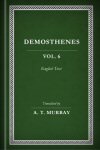
Demosthenes, vol. 6
- Author: Demosthenes
- Translator: A. T. Murray
- Series: Loeb Classical Library
- Publisher: Harvard University Press
- Publication Date: 1939
- Pages: 232
This volume contains A. T. Murray’s translations of Demosthenes’ speeches 50–59.
Demosthenes (384–322 BC) was a pleader in law courts who later became a statesman. Known as the best Athenian orator, he was a champion of the past greatness of his city and of the resistance of Greece to the rise to supremacy of Philip of Macedon. He is known for his steadfastness of purpose, his sincerity, his clear arguments, and his severe control of language.
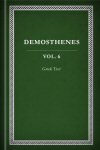
Demosthenes, vol. 6: Greek Text
- Author: Demosthenes
- Series: Loeb Classical Library
- Publisher: Harvard University Press
- Publication Date: 1939
- Pages: 232
This volume contains the Greek texts of Demosthenes’ speeches 50–59.
Demosthenes (384–322 BC) was a pleader in law courts who later became a statesman. Known as the best Athenian orator, he was a champion of the past greatness of his city and of the resistance of Greece to the rise to supremacy of Philip of Macedon. He is known for his steadfastness of purpose, his sincerity, his clear arguments, and his severe control of language.
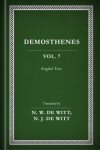
Demosthenes, vol. 7
- Author: Demosthenes
- Translator: N. W. De Witt and N. J. De Witt
- Series: Loeb Classical Library
- Publisher: Harvard University Press
- Publication Date: 1949
- Pages: 200
This volume contains N. W. and N. J. De Witt’s translations of Demosthenes’ speeches 60–61.
Demosthenes (384–322 BC) was a pleader in law courts who later became a statesman. Known as the best Athenian orator, he was a champion of the past greatness of his city and of the resistance of Greece to the rise to supremacy of Philip of Macedon. He is known for his steadfastness of purpose, his sincerity, his clear arguments, and his severe control of language.
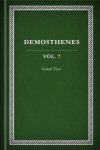
Demosthenes, vol. 7: Greek Text
- Author: Demosthenes
- Series: Loeb Classical Library
- Publisher: Harvard University Press
- Publication Date: 1949
- Pages: 200
This volume contains the Greek texts of Demosthenes’ speeches 60–61.
Demosthenes (384–322 BC) was a pleader in law courts who later became a statesman. Known as the best Athenian orator, he was a champion of the past greatness of his city and of the resistance of Greece to the rise to supremacy of Philip of Macedon. He is known for his steadfastness of purpose, his sincerity, his clear arguments, and his severe control of language.
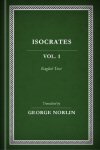
Isocrates, vol. 1
- Author: Isocrates
- Translator: George Norlin
- Series: Loeb Classical Library
- Publisher: Harvard University Press
- Publication Date: 1928
- Pages: 232
This volume contains George Norlin’s translations of To Demonicus, To Nicocles, Nicocles, Panegyricus, To Philip, and Archidamus.
Isocrates (ca. 436–338 BC) wrote speeches for Athenian law courts and then became a teacher of composition for would-be orators. After setting up a school of rhetoric in Chios, he returned to Athens and established a free school of philosophy involving a practical education of the whole mind, character, judgment, and mastery of language. This school had famous pupils from all over the Greek world. Isocrates also wrote essays on political questions, his main idea being a united Greece to conquer the Persian Empire.
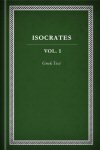
Isocrates, vol. 1: Greek Text
- Author: Isocrates
- Series: Loeb Classical Library
- Publisher: Harvard University Press
- Publication Date: 1928
- Pages: 232
This volume contains the Greek texts of To Demonicus, To Nicocles, Nicocles, Panegyricus, To Philip, and Archidamus.
Isocrates (ca. 436–338 BC) wrote speeches for Athenian law courts and then became a teacher of composition for would-be orators. After setting up a school of rhetoric in Chios, he returned to Athens and established a free school of philosophy involving a practical education of the whole mind, character, judgment, and mastery of language. This school had famous pupils from all over the Greek world. Isocrates also wrote essays on political questions, his main idea being a united Greece to conquer the Persian Empire.
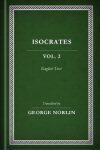
This volume contains George Norlin’s translations of Areopagiticus, On the Peace, Panathenaicus, Against the Sophists, and Antidosis.
Isocrates (ca. 436–338 BC) wrote speeches for Athenian law courts and then became a teacher of composition for would-be orators. After setting up a school of rhetoric in Chios, he returned to Athens and established a free school of philosophy involving a practical education of the whole mind, character, judgment, and mastery of language. This school had famous pupils from all over the Greek world. Isocrates also wrote essays on political questions, his main idea being a united Greece to conquer the Persian Empire.
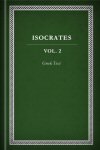
This volume contains the Greek texts of Areopagiticus, On the Peace, Panathenaicus, Against the Sophists, and Antidosis.
Isocrates (ca. 436–338 BC) wrote speeches for Athenian law courts and then became a teacher of composition for would-be orators. After setting up a school of rhetoric in Chios, he returned to Athens and established a free school of philosophy involving a practical education of the whole mind, character, judgment, and mastery of language. This school had famous pupils from all over the Greek world. Isocrates also wrote essays on political questions, his main idea being a united Greece to conquer the Persian Empire.
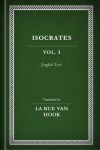
This volume contains La Rue Van Hook’s translations of Evagoras, Helen, Busiris, Plataicus, Concerning the Team of Horses, Trapeziticus, Against Callimachus, Aegineticus, Against Lochites, Against Euthynus, and nine letters.
Isocrates (ca. 436–338 BC) wrote speeches for Athenian law courts and then became a teacher of composition for would-be orators. After setting up a school of rhetoric in Chios, he returned to Athens and established a free school of philosophy involving a practical education of the whole mind, character, judgment, and mastery of language. This school had famous pupils from all over the Greek world. Isocrates also wrote essays on political questions, his main idea being a united Greece to conquer the Persian Empire.
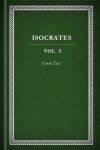
This volume contains the Greek texts of Evagoras, Helen, Busiris, Plataicus, Concerning the Team of Horses, Trapeziticus, Against Callimachus, Aegineticus, Against Lochites, Against Euthynus, and nine letters.
Isocrates (ca. 436–338 BC) wrote speeches for Athenian law courts and then became a teacher of composition for would-be orators. After setting up a school of rhetoric in Chios, he returned to Athens and established a free school of philosophy involving a practical education of the whole mind, character, judgment, and mastery of language. This school had famous pupils from all over the Greek world. Isocrates also wrote essays on political questions, his main idea being a united Greece to conquer the Persian Empire.
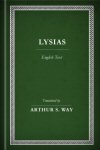
This volume contains W. R. M. Lamb’s translations of Lysias’ speeches.
Lysias (ca. 458–380 BC) was born at Athens, the son of a wealthy Syracusan settled in Attica. He lived in Peiraeus, where, with his brother, he inherited his father’s shield factory. Being a loyal supporter of democracy, Lysias took the side of the democrats at Athens against the 30 Tyrants in 404, supplying shields and money. After one political speech in accusation of Eratosthenes in 405, he became a busy professional speechwriter for the law courts. At the Olympic festival of 388, he denounced, with riotous results, the costly display of the embassy sent by Dionysius I of Syracuse and the domination of Sicily by Dionysius.
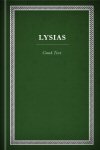
This volume contains the Greek texts of Lysias’ speeches.
Lysias (ca. 458–380 BC) was born at Athens, the son of a wealthy Syracusan settled in Attica. He lived in Peiraeus, where, with his brother, he inherited his father’s shield factory. Being a loyal supporter of democracy, Lysias took the side of the democrats at Athens against the 30 Tyrants in 404, supplying shields and money. After one political speech in accusation of Eratosthenes in 405, he became a busy professional speechwriter for the law courts. At the Olympic festival of 388, he denounced, with riotous results, the costly display of the embassy sent by Dionysius I of Syracuse and the domination of Sicily by Dionysius.